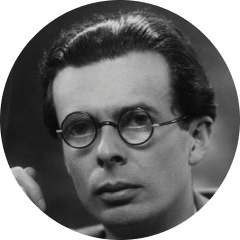Aldous Huxley
(1894–1963)
Aldous Huxley (1894–1963): novelist, poet and essayist, whose early novels Crome Yellow (1921) and Antic Hay (1923) were successful satires of post-war English culture. While teaching at Eton, Aldous told his brother Julian in December 1916 that he ‘ought to read’ Eliot’s ‘things’, which are ‘all the more remarkable when one knows the man, ordinarily just a Europeanized American, overwhelmingly cultured, talking about French literature in the most uninspired fashion imaginable’. For his part, Eliot thought Huxley’s early poems fell too much under the spell of Laforgue (and of his own poetry), but Huxley went on to become, not only a popular comic novelist, but, as the author of Brave New World and The Doors of Perception, an influential intellectual figure. See Nicholas Murray, Aldous Huxley: An English Intellectual (2002); Aldous Huxley, Selected Letters, ed. James Sexton (2007).
